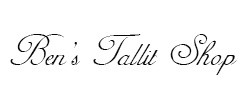Our customers are often somewhat unclear about the machine-spun and hand-spun tzitzit options we offer on just about every product page. Probably a better term would be machine-twined and hand-twined, but nobody in the tzitzit business uses those terms. And it definitely does not refer to the tying, which is always done by hand. There's no such thing as a tzitzit tying machine!
The distinction between the two is mostly a halachic difference. This week we received an inquiry from a prospective customer who was unsure what type of tzitzit he has on his tallit katan.
Hi, I'm looking to buy some tzitzis and I just wanted to get some clarification about handspun vs machine spun. I've been wearing the NeaTzit brand tzitzis (with the metal snaps) for years, size 22, with Ashkenaz strings. I'm looking to get some new ones, but I understand that company went out of business, so I was looking at the Cotton Comfort ones you sell with the straps (I've tried PerfTzit and don't like the fit and round neck). When I checkout it gives options for both machine spun and handspun strings. Is handspun the standard, with machine spun considered a kulah? I don't remember what the NeaTzit ones were; do you know if NeaTzit ever used machine spun? Of course I'm not expecting a psak; I'm just looking for a bit of informational guidance. Thanks, Yehuda
I explained to Yehuda that to some people machine-spun would be considered a leniency. On the other hand all undershirt and t-shirt tzitzit products come with thin machine-spun tzitzit tied on by the manufacturer. Many customers opt to upgrade to hand-spun (or want techelet).
To understand the issue behind the two types of tzitzit strings please refer to this article.
The matter of machine-spun strings versus hand-spun strings closely parallels the matter of hand-matzoh versus machine-matzoh on the Seder Night (but not the remainder of Pesach). Obviously we eat matzah on Pesach because we can't eat bread, but there is also a positive mitzvah to eat matzah on the night of the Seder. To fulfill this mitzvah, the matzah must be made with intention for the mitzvah. The question then is whether that "mitzvah intention" can be achieved when a person operates the matzah making machine and then the machine does the actual work.
In the case of tzitzit strings production, the same question arises. Hand-spun means that Jewish workers operate the twining machine with their own two hands.
I'm at a loss over how to answer your question whether machine-spun is a leniency or hand-spun is a stringency. The more modern looking tallit styles come with machine-spun tzitzit standard, just like the undershirt tzitzit and t-shirt tzitzit products mentioned above. High-end traditional wool black-striped and white-striped tallits usually come from the manufacturer without tzitzit and almost nobody who opts for such a tallit would tie machine-spun tzitzit on it.
 United States Dollar
United States Dollar
 Shekel
Shekel
 Euro
Euro
 British Pound
British Pound
 Australian Dollar
Australian Dollar
 New Zealand Dollar
New Zealand Dollar
 Canadian Dollar
Canadian Dollar
